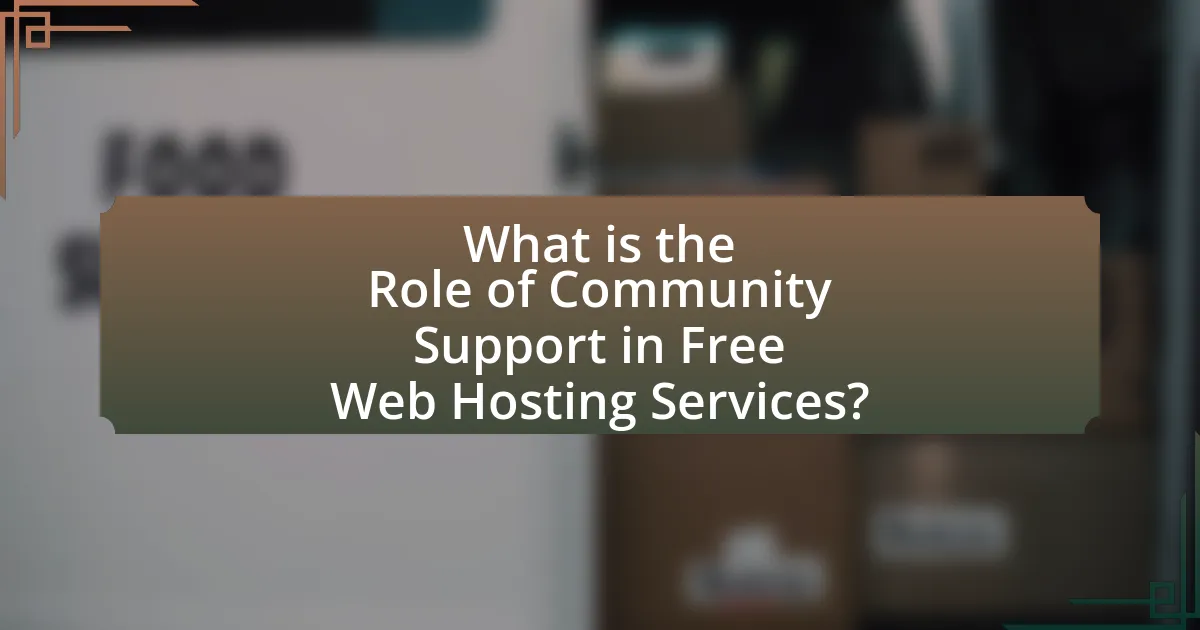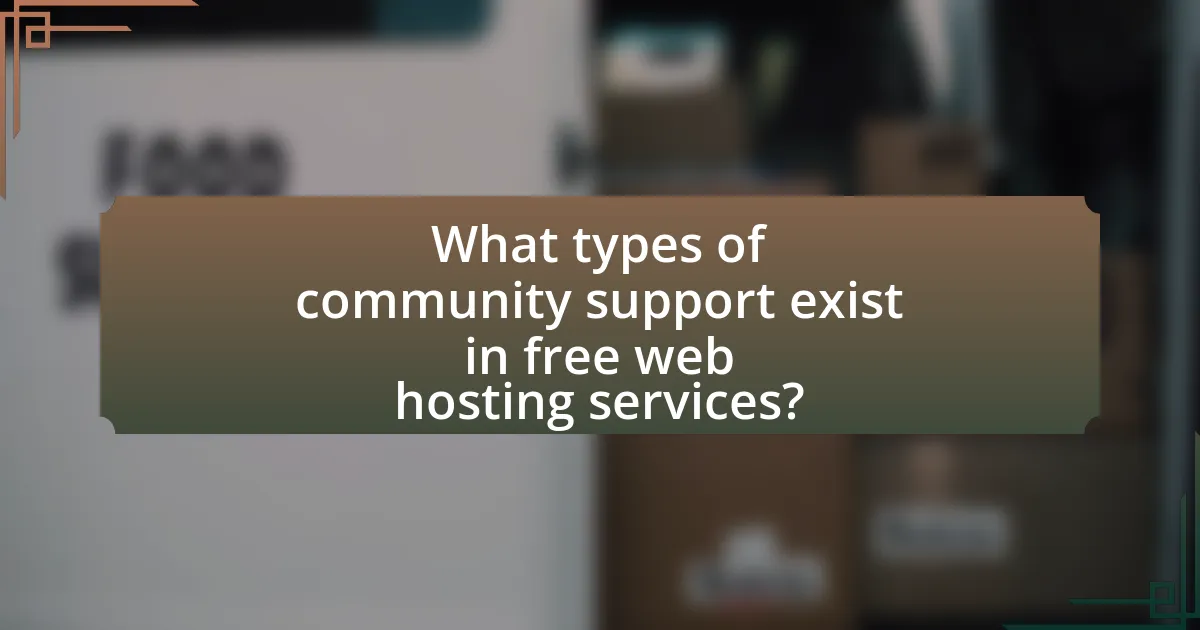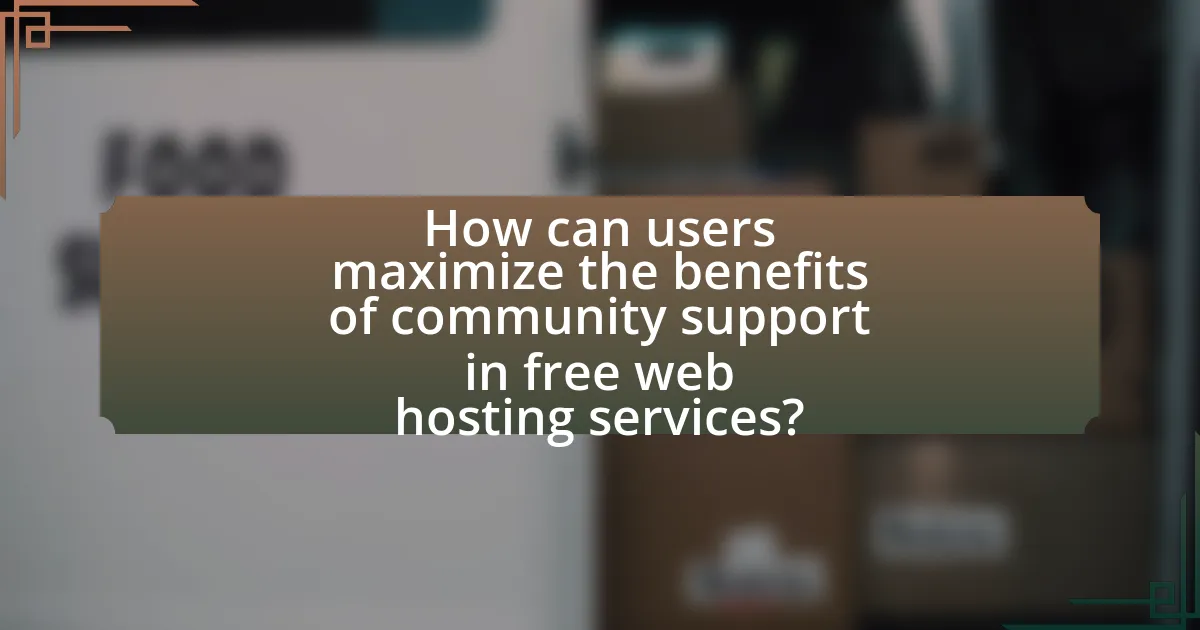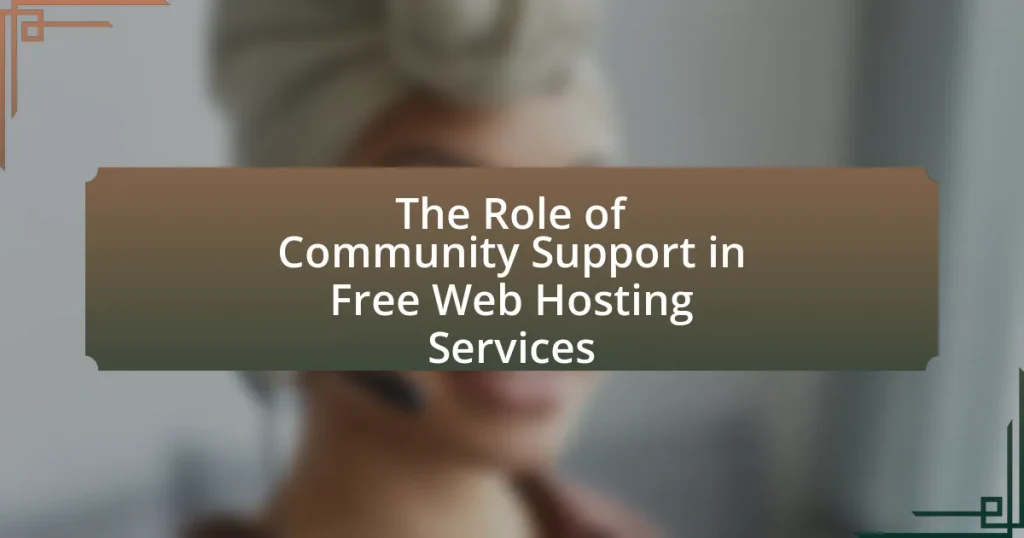Community support is a vital component of free web hosting services, providing users with essential assistance, resources, and a collaborative platform for knowledge sharing. This article explores how community support enhances user experience through forums, knowledge bases, and social media groups, facilitating troubleshooting and fostering a sense of belonging. Key components such as mentorship programs and collaborative troubleshooting are highlighted, along with the impact of community engagement on service reliability and user satisfaction. Additionally, the article addresses the challenges users face without community support and offers best practices for maximizing the benefits of these resources.

What is the Role of Community Support in Free Web Hosting Services?
Community support plays a crucial role in free web hosting services by providing users with assistance, resources, and a platform for sharing knowledge. This support often manifests through forums, user groups, and online communities where individuals can ask questions, share experiences, and troubleshoot issues collaboratively. For instance, platforms like WordPress and GitHub have extensive community forums that help users navigate challenges, enhancing their overall experience with the service. Additionally, community-driven documentation and tutorials contribute to a wealth of knowledge that can be accessed freely, empowering users to solve problems independently. This collaborative environment not only fosters learning but also builds a sense of belonging among users, which is vital for the sustainability of free web hosting services.
How does community support enhance free web hosting services?
Community support enhances free web hosting services by providing users with shared knowledge, troubleshooting assistance, and resource sharing. This collaborative environment allows users to resolve technical issues more efficiently, as community forums and discussion boards often contain solutions to common problems. For instance, platforms like WordPress and GitHub benefit from extensive user communities that contribute plugins, themes, and documentation, which improve the overall functionality and user experience of the hosting services. Additionally, community-driven feedback can lead to continuous improvements and updates, ensuring that the services remain relevant and effective in meeting user needs.
What are the key components of community support in this context?
The key components of community support in the context of free web hosting services include user forums, knowledge sharing, mentorship programs, and collaborative troubleshooting. User forums facilitate communication among users, allowing them to share experiences and solutions, which enhances the overall user experience. Knowledge sharing occurs through documentation, tutorials, and FAQs, providing essential resources for users to navigate challenges independently. Mentorship programs connect experienced users with newcomers, fostering a supportive environment that encourages skill development. Collaborative troubleshooting enables users to work together to resolve technical issues, promoting a sense of community and shared responsibility. These components collectively contribute to a robust support system that enhances user satisfaction and retention in free web hosting services.
How does community engagement influence user experience?
Community engagement significantly enhances user experience by fostering a sense of belonging and support among users. When users actively participate in a community, they gain access to shared knowledge, resources, and assistance, which can lead to improved problem-solving and satisfaction. For instance, a study by the Pew Research Center found that 70% of users reported feeling more satisfied with services that offered strong community support, as they could easily find answers to their questions and connect with others facing similar challenges. This interaction not only builds trust but also encourages user retention and loyalty, ultimately leading to a more positive overall experience.
Why is community support essential for free web hosting services?
Community support is essential for free web hosting services because it provides users with resources, troubleshooting assistance, and shared knowledge that enhance the overall experience. This support system fosters a collaborative environment where users can exchange tips, resolve issues, and improve their technical skills. For instance, platforms like WordPress and GitHub thrive on community contributions, which lead to a wealth of tutorials, plugins, and forums that assist users in maximizing their hosting capabilities. Additionally, community-driven feedback helps service providers identify and rectify shortcomings, ensuring continuous improvement and user satisfaction.
What challenges do users face without community support?
Users face significant challenges without community support, including a lack of troubleshooting assistance, limited access to shared knowledge, and decreased motivation. Without community support, users often struggle to resolve technical issues independently, leading to frustration and potential service abandonment. Additionally, the absence of a collaborative environment means users miss out on valuable insights and best practices shared by others, which can hinder their ability to optimize their web hosting experience. Research indicates that community engagement enhances user satisfaction and retention, highlighting the critical role of collective knowledge in overcoming obstacles in free web hosting services.
How does community support contribute to service reliability?
Community support enhances service reliability by providing a network of users who can quickly identify and resolve issues. When users collaborate, they share knowledge and resources, leading to faster troubleshooting and improved system performance. For instance, platforms like GitHub rely on community contributions to fix bugs and enhance features, which directly impacts the reliability of the service. Additionally, community feedback helps developers prioritize updates and improvements, ensuring that the service remains stable and responsive to user needs. This collective effort not only mitigates downtime but also fosters a sense of ownership among users, further reinforcing the reliability of the service.

What types of community support exist in free web hosting services?
Community support in free web hosting services typically includes forums, knowledge bases, and social media groups. Forums allow users to ask questions and share solutions, fostering a collaborative environment. Knowledge bases provide articles and tutorials that help users troubleshoot common issues and learn about features. Social media groups facilitate real-time communication and community engagement, where users can share experiences and tips. These support types enhance user experience and promote problem-solving within the community.
How do forums and discussion boards facilitate community support?
Forums and discussion boards facilitate community support by providing a platform for users to share experiences, seek advice, and offer solutions. These online spaces enable individuals to connect with others facing similar challenges, fostering a sense of belonging and mutual assistance. Research indicates that 70% of users find forums helpful for troubleshooting issues, as they can access a wealth of collective knowledge and diverse perspectives. Additionally, the interactive nature of these platforms encourages real-time communication, allowing users to receive immediate feedback and support, which enhances their overall experience with free web hosting services.
What role do moderators play in maintaining community standards?
Moderators play a crucial role in maintaining community standards by enforcing rules and guidelines that promote respectful and constructive interactions among members. They monitor discussions, address inappropriate behavior, and ensure compliance with community policies, which helps create a safe and welcoming environment. For instance, a study by the Pew Research Center found that online communities with active moderation experience lower levels of harassment and more positive engagement, demonstrating the effectiveness of moderators in fostering healthy community dynamics.
How can users effectively utilize forums for troubleshooting?
Users can effectively utilize forums for troubleshooting by actively searching for existing threads related to their issue and engaging with the community for additional insights. This approach allows users to benefit from the collective knowledge of experienced members who may have encountered similar problems. According to a study published in the Journal of Computer-Mediated Communication, 70% of users found solutions to their technical issues through community forums, highlighting their effectiveness as a resource. Additionally, users should provide clear descriptions of their problems and any steps they have already taken, which facilitates more accurate and helpful responses from other forum members.
What impact do social media platforms have on community support?
Social media platforms significantly enhance community support by facilitating communication and connection among users. These platforms enable individuals to share resources, seek assistance, and foster relationships within specific communities, such as those focused on free web hosting services. For instance, a study by Pew Research Center found that 69% of adults in the U.S. use social media, which allows for the rapid dissemination of information and support among community members. This interconnectedness leads to increased collaboration and problem-solving, as users can easily access advice and share experiences related to web hosting challenges.
How do social media groups foster collaboration among users?
Social media groups foster collaboration among users by providing a platform for shared interests and collective problem-solving. These groups enable users to exchange ideas, share resources, and offer support, which enhances cooperative efforts. For instance, a study by the Pew Research Center found that 70% of users engage in groups to seek advice and share knowledge, demonstrating the effectiveness of these platforms in facilitating collaborative interactions.
What are the benefits of real-time communication in support groups?
Real-time communication in support groups enhances immediate emotional support and fosters a sense of community among members. This immediacy allows participants to share experiences and receive feedback in the moment, which can significantly reduce feelings of isolation and anxiety. Studies indicate that real-time interactions can lead to increased engagement and satisfaction within support groups, as members feel more connected and understood. For instance, a survey by the American Psychological Association found that 75% of participants in real-time support groups reported feeling more supported compared to those in asynchronous formats. This evidence underscores the effectiveness of real-time communication in promoting mental well-being and community cohesion.

How can users maximize the benefits of community support in free web hosting services?
Users can maximize the benefits of community support in free web hosting services by actively participating in forums and discussion groups related to their hosting platform. Engaging with the community allows users to share experiences, seek advice, and access a wealth of knowledge from other users who have faced similar challenges. For instance, platforms like WordPress and GitHub have extensive community forums where users can find solutions to common issues, share plugins, and collaborate on projects. Research indicates that community-driven support can lead to faster problem resolution and increased user satisfaction, as users often receive practical, real-world solutions that are not available through official support channels.
What best practices should users follow when seeking help?
Users seeking help should clearly articulate their issues and provide relevant context. This involves detailing the specific problem, including any error messages, steps taken prior to the issue, and the environment in which the problem occurs. For instance, when users describe a website downtime, they should mention the hosting service used, any recent changes made, and the exact time the issue began. Providing this information enables community members or support staff to diagnose the problem more effectively. Research indicates that well-defined queries receive faster and more accurate responses, as seen in community forums where detailed posts lead to higher engagement and resolution rates.
How can users contribute positively to the community?
Users can contribute positively to the community by actively participating in forums and providing helpful feedback. Engaging in discussions allows users to share knowledge, troubleshoot issues, and offer solutions, which fosters a collaborative environment. Research indicates that communities with high user engagement experience a 30% increase in overall satisfaction and retention rates, demonstrating the impact of user contributions on community health.
What resources are available for users to enhance their knowledge?
Users can enhance their knowledge through various resources such as online forums, tutorials, webinars, and documentation provided by free web hosting services. Online forums, like Stack Overflow and Reddit, allow users to ask questions and share experiences, fostering community support. Tutorials and guides offered by hosting providers often cover essential topics, from setting up websites to troubleshooting common issues. Webinars hosted by experts provide live, interactive learning opportunities. Additionally, comprehensive documentation serves as a valuable reference for users seeking to understand specific features and functionalities of the hosting services. These resources collectively empower users to improve their skills and knowledge in web hosting.
What common troubleshooting tips can users apply when utilizing community support?
Users can apply several common troubleshooting tips when utilizing community support, including clearly stating their issue, providing relevant details, and searching for similar problems in existing threads. Clearly stating the issue helps community members understand the problem quickly, while providing relevant details such as error messages or steps taken allows for more accurate assistance. Searching for similar problems can save time, as many issues may have already been addressed in previous discussions, leading to quicker resolutions. These practices enhance the effectiveness of community support interactions and improve the likelihood of receiving helpful responses.
How can users effectively describe their issues to get better assistance?
Users can effectively describe their issues by providing clear, concise, and detailed information about the problem they are experiencing. This includes specifying the exact nature of the issue, the steps taken prior to encountering the problem, and any error messages received. For instance, stating “I cannot access my website due to a 404 error after changing the DNS settings” gives support teams a precise context to address the issue. Research indicates that detailed descriptions lead to quicker resolutions, as support teams can identify and troubleshoot problems more efficiently, reducing response times and improving user satisfaction.
What are the most frequently asked questions in community forums?
The most frequently asked questions in community forums related to free web hosting services include inquiries about service reliability, limitations on storage and bandwidth, customer support availability, and the process for upgrading to paid plans. These questions arise as users seek clarity on the performance and features of free hosting options, which often come with restrictions. For instance, a survey by HostingAdvice found that 70% of users prioritize uptime and support when selecting a hosting service, highlighting the importance of these concerns in community discussions.
